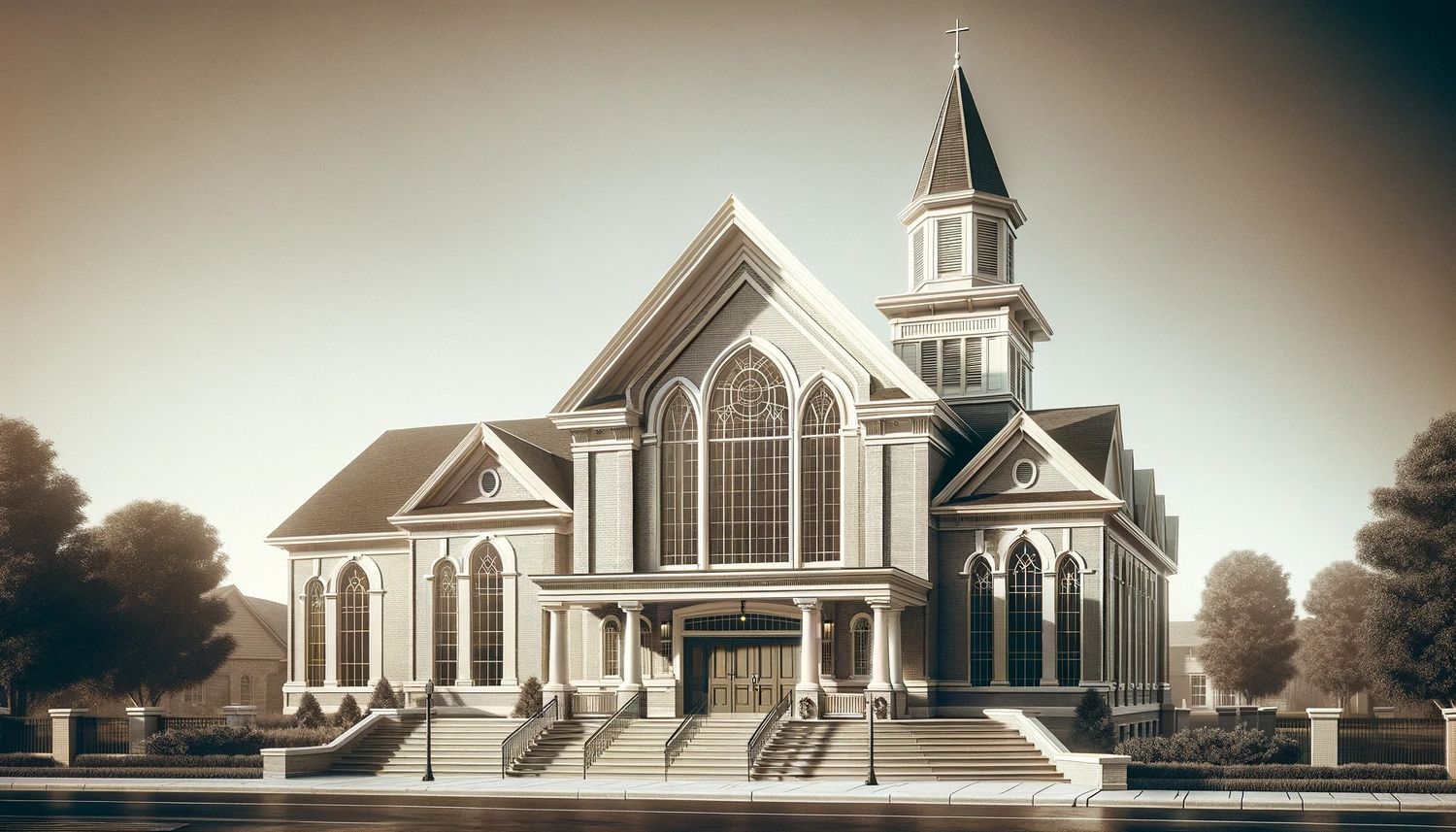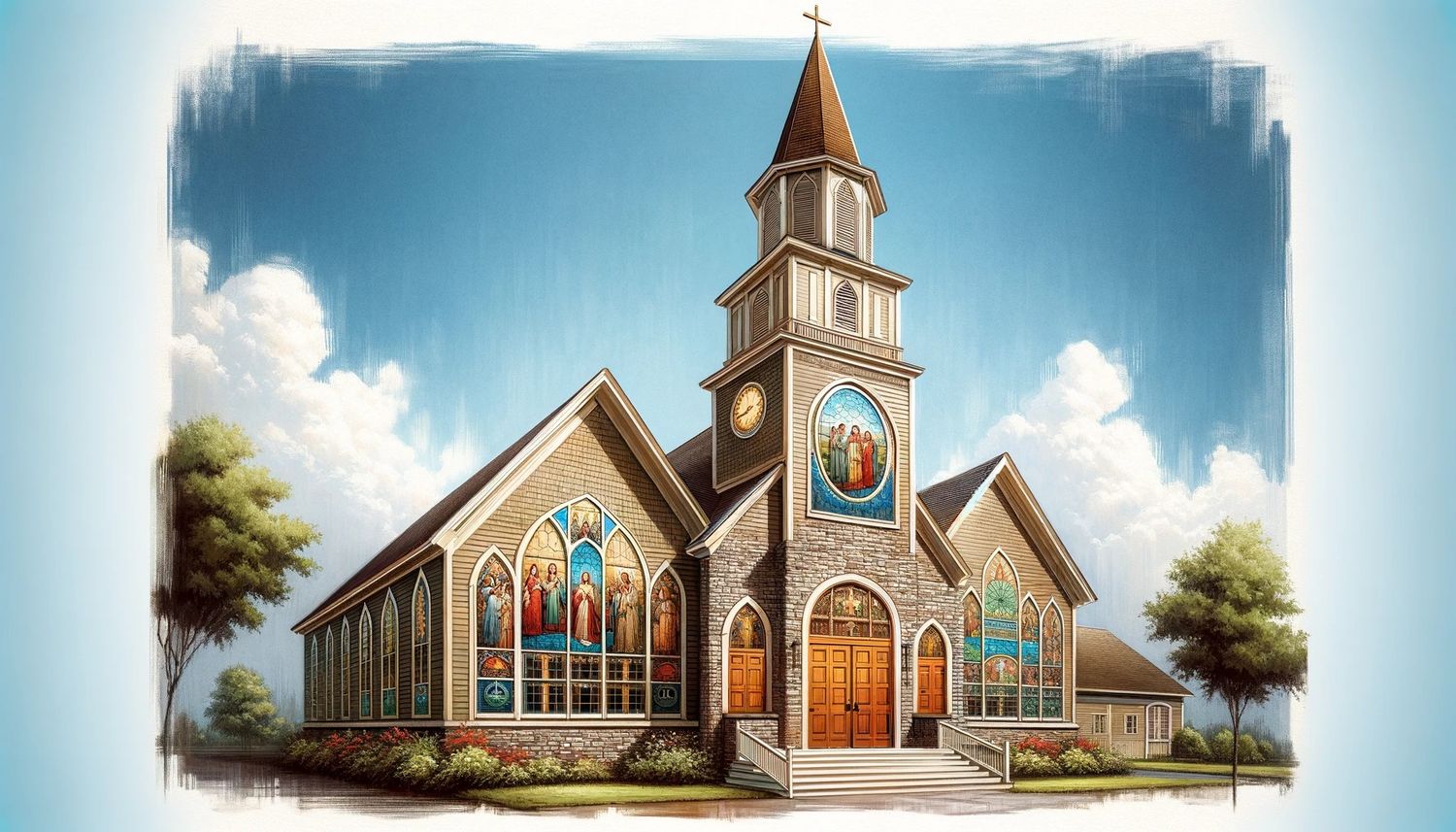Home>Theology and Spirituality>What Kind Of Church Is Baptist


Theology and Spirituality
What Kind Of Church Is Baptist
Published: February 20, 2024
Jason DeRose, Managing Editor at Christian.net, uses his expertise in religion and journalism to deepen understanding of faith's societal impacts. His editorial leadership, coupled with a strong academic background, enriches the platform’s diverse content, earning him recognition in both journalism and religious circles.
Discover the theology and spirituality of Baptist churches and understand what sets them apart. Explore the beliefs and practices that define the Baptist tradition.
(Many of the links in this article redirect to a specific reviewed product. Your purchase of these products through affiliate links helps to generate commission for Christian.net, at no extra cost. Learn more)
Table of Contents
Introduction
The Baptist Church is a significant denomination within Christianity, known for its distinct beliefs and practices. With a rich history and a strong emphasis on individual faith and congregational autonomy, the Baptist Church has made a lasting impact on the religious landscape.
From its origins in the early 17th century to its present-day influence, the Baptist Church has evolved and diversified, encompassing a wide array of beliefs and traditions. Understanding the essence of the Baptist Church involves delving into its historical roots, core beliefs, community structure, and mission outreach.
In this comprehensive exploration, we will delve into the history, beliefs, practices, structure, worship, community, and mission of the Baptist Church. By gaining insight into these aspects, we can appreciate the unique characteristics that define the Baptist Church and its role in the spiritual lives of its members and the broader community.
Read more: What Kind Of Christian Is Baptist
History of the Baptist Church
The history of the Baptist Church is a compelling narrative that traces back to the early 17th century. Its roots can be found in the English Reformation, a period marked by significant religious and social upheaval. The Baptist tradition emerged amidst a fervent desire for religious freedom and a return to the simplicity of New Testament Christianity.
One of the defining moments in Baptist history is linked to the influential figure of John Smyth, an English separatist who is often regarded as one of the founders of the Baptist movement. In 1609, Smyth led a group of believers in the establishment of the first Baptist church in Amsterdam. This marked a pivotal shift away from the prevailing infant baptism practices, as Smyth advocated for adult baptism based on personal confession of faith.
The Baptist movement gained momentum with the efforts of Thomas Helwys, who is credited with establishing the first Baptist congregation on English soil in 1612. Helwys championed the principles of religious liberty and the autonomy of the local church, laying the groundwork for the distinctive Baptist belief in the separation of church and state.
Throughout the centuries, the Baptist Church underwent diversification and expansion, with various branches and associations forming in different regions. The influence of Baptist missionaries and the spread of Baptist ideals contributed to its global presence, leading to the establishment of Baptist communities in diverse cultural contexts.
The Baptist Church played a significant role in the shaping of religious freedom and the advancement of social justice. Its commitment to individual conscience, believer's baptism, and congregational governance has left an indelible mark on the broader Christian landscape.
Today, the Baptist Church continues to evolve, embracing a spectrum of theological perspectives while upholding its foundational principles. The rich history of the Baptist Church serves as a testament to the enduring legacy of faith, freedom, and the pursuit of spiritual truth.
This historical journey illuminates the resilience and adaptability of the Baptist tradition, reflecting its enduring relevance in an ever-changing world.
Beliefs and Practices
The Baptist Church is characterized by a set of core beliefs and practices that shape its identity and guide the spiritual lives of its members. At the heart of Baptist theology is a strong emphasis on individual faith, the authority of Scripture, and the priesthood of all believers. These foundational principles underpin the distinct beliefs and practices that define the Baptist tradition.
Beliefs
-
Sola Scriptura: Baptists uphold the belief in the sole authority of the Bible as the Word of God. They emphasize the importance of personal interpretation of Scripture and the direct guidance of the Holy Spirit in understanding and applying its teachings.
-
Believer's Baptism: Central to Baptist theology is the practice of believer's baptism, which involves the immersion of individuals who have made a personal profession of faith in Jesus Christ. This symbolic act signifies the believer's identification with Christ's death, burial, and resurrection.
-
Autonomy of the Local Church: Baptists affirm the autonomy of each local congregation, granting them the freedom to govern their affairs and make decisions independently. This principle reflects the Baptist commitment to congregational self-governance and the absence of hierarchical authority.
-
Priesthood of All Believers: In line with the Protestant Reformation, Baptists uphold the priesthood of all believers, emphasizing the direct access of every individual to God without the need for intermediaries. This belief underscores the personal responsibility and privilege of every believer to engage in prayer, worship, and service.
Practices
-
Worship: Baptist worship services often center on expository preaching, congregational singing, and prayer. The emphasis on the preaching of God's Word reflects the Baptist reverence for biblical teaching and its relevance to everyday life.
-
Lord's Supper: The observance of the Lord's Supper, also known as communion, holds significance in Baptist practice. This symbolic act of partaking in the bread and the cup commemorates the sacrificial death of Jesus Christ and serves as a time of reflection and spiritual renewal for believers.
-
Discipleship and Evangelism: Baptists are committed to the mission of making disciples and sharing the message of salvation. This involves personal evangelism, outreach initiatives, and a dedication to nurturing spiritual growth and maturity among believers.
-
Social Engagement: Many Baptist congregations are actively involved in social justice initiatives, community outreach programs, and humanitarian efforts. This commitment to social engagement reflects the Baptist conviction of demonstrating Christ's love through compassionate action.
The beliefs and practices of the Baptist Church exemplify a deep-rooted commitment to biblical truth, individual faith, and the mission of sharing the gospel. These foundational elements continue to shape the spiritual journey of Baptists and underscore their enduring impact on the broader Christian community.
Read more: What Are Baptist Churches
Baptist Church Structure
The structure of the Baptist Church is characterized by its commitment to congregational autonomy and the absence of a centralized hierarchy. This distinctive organizational framework reflects the Baptist belief in the self-governance of individual congregations and the priesthood of all believers. While Baptist churches vary in size, style, and specific practices, they commonly adhere to a similar structural model that emphasizes local autonomy and democratic decision-making.
At the core of the Baptist Church structure is the local congregation, which serves as the primary unit of governance and worship. Each congregation operates independently, with its own elected leaders, administrative processes, and decision-making mechanisms. This autonomy grants the congregation the freedom to discern and implement its vision, mission, and ministry initiatives without external interference.
Leadership within a Baptist congregation typically includes ordained ministers, deacons, and various ministry leaders who collaborate to oversee the spiritual and practical needs of the church community. The role of the pastor holds particular significance, as they are responsible for providing spiritual guidance, preaching, teaching, and pastoral care. While some Baptist churches may have multiple pastors or a leadership team, the emphasis remains on shared leadership and the active involvement of the congregation in decision-making processes.
In addition to the local congregation, Baptist churches often affiliate with regional associations or conventions that provide opportunities for fellowship, mutual support, and collaborative mission endeavors. These associations serve as voluntary networks through which churches can engage in cooperative efforts, share resources, and address common challenges. However, it is important to note that these associations do not hold authority over individual churches, as each congregation retains its autonomy in matters of belief, practice, and governance.
The Baptist Church structure also encompasses broader entities such as state conventions and national organizations, which facilitate collective initiatives, theological education, and mission endeavors. While these entities may offer resources and support, they do not exercise hierarchical control over local churches, reinforcing the Baptist commitment to congregational autonomy.
This decentralized structure reflects the Baptist emphasis on the priesthood of all believers and the belief that each member has a vital role to play in the life and ministry of the church. By upholding congregational autonomy and shared leadership, the Baptist Church structure fosters a sense of ownership, accountability, and community engagement within each local congregation, empowering members to actively participate in the spiritual journey and collective mission of the church.
Worship and Sacraments
Worship lies at the heart of the Baptist Church, serving as a central expression of faith, community, and spiritual devotion. Baptist worship services are characterized by a reverence for God's Word, congregational participation, and a focus on the core elements of Christian faith. The worship experience in a Baptist congregation is designed to inspire, edify, and facilitate a deep encounter with God.
Expository Preaching
One of the defining features of Baptist worship is the emphasis on expository preaching. This form of preaching involves the systematic exposition and explanation of biblical passages, allowing the congregation to gain a deeper understanding of Scripture and its relevance to their lives. Through expository preaching, Baptist pastors seek to illuminate the truths of the Bible, address contemporary issues, and provide spiritual guidance to the congregation.
Congregational Singing
Baptist worship services often feature congregational singing as a vital component of communal worship. Hymns and contemporary worship songs are sung collectively, creating a sense of unity, praise, and adoration. The act of congregational singing fosters a shared experience of worship, allowing individuals to express their faith through music and participate in the corporate exaltation of God.
Prayer
Prayer holds a prominent place in Baptist worship, serving as a means of communion with God and intercession for the needs of the church and the broader community. Prayers offered during worship services encompass adoration, confession, thanksgiving, and supplication, reflecting the multifaceted nature of communication with the divine. The inclusion of corporate prayer underscores the Baptist belief in the power of communal intercession and the importance of seeking God's guidance and provision as a unified body of believers.
The Lord's Supper
The observance of the Lord's Supper, also known as communion, holds significant importance in Baptist worship. This sacramental practice involves the partaking of bread and wine (or grape juice) in remembrance of the sacrificial death of Jesus Christ. The Lord's Supper serves as a poignant moment of reflection, spiritual renewal, and communal remembrance of Christ's redemptive work. For Baptists, the Lord's Supper is a symbolic act that signifies the believer's participation in the body and blood of Christ, as well as a reaffirmation of their faith and commitment to the Christian community.
Baptism
Baptism, particularly believer's baptism by immersion, is another fundamental aspect of Baptist worship and sacramental practice. The act of baptism symbolizes the believer's identification with the death, burial, and resurrection of Jesus Christ, signifying their spiritual rebirth and public declaration of faith. Baptism is viewed as an outward expression of an inward transformation, marking the believer's initiation into the community of faith and their commitment to following Christ.
In essence, Baptist worship and sacraments embody the core tenets of the faith, providing a sacred space for spiritual encounter, communal expression, and the celebration of God's redemptive work. Through the integration of expository preaching, congregational singing, prayer, the Lord's Supper, and baptism, Baptist worship serves as a vibrant tapestry of devotion, reflection, and communal participation in the life of faith.
Baptist Church Community
The Baptist Church community is a vibrant tapestry of individuals united by their shared faith, commitment to spiritual growth, and mutual support. At the heart of the Baptist community lies a deep sense of fellowship, accountability, and interconnectedness, fostering an environment where members can cultivate meaningful relationships and experience genuine care and belonging.
Central to the Baptist Church community is the concept of koinonia, a Greek term that encapsulates the idea of intimate fellowship and partnership among believers. This fellowship extends beyond mere social interaction, encompassing a profound sense of spiritual communion and shared purpose. Within the Baptist community, koinonia manifests through acts of compassion, mutual encouragement, and the bearing of one another's burdens, reflecting the biblical call to love, serve, and uplift one another.
The Baptist Church community provides a nurturing environment for individuals to engage in spiritual formation and discipleship. Through small groups, Bible studies, and mentorship relationships, members have the opportunity to grow in their faith, deepen their understanding of Scripture, and receive guidance and support on their spiritual journey. This emphasis on discipleship underscores the Baptist commitment to equipping believers for a life of faithful service and witness in the world.
In addition to spiritual growth, the Baptist community is characterized by its dedication to caring for the practical needs of its members. Acts of benevolence, hospitality, and compassionate outreach are integral to the fabric of the Baptist Church, reflecting the embodiment of Christ's love in tangible ways. Whether through providing assistance to those facing hardship, offering a listening ear to the hurting, or extending hospitality to newcomers, the Baptist community exemplifies a spirit of generosity and empathy.
The Baptist Church community also serves as a place of celebration, where milestones, achievements, and joys are shared and honored. From baptisms and weddings to anniversaries and accomplishments, the community rallies around its members, rejoicing in their triumphs and offering support during times of celebration.
Furthermore, the Baptist Church community extends beyond the walls of the church building, engaging with the broader society through outreach initiatives, social advocacy, and humanitarian endeavors. This outward focus reflects the Baptist commitment to being a positive force for change and transformation in the world, addressing societal needs and advocating for justice and compassion.
In essence, the Baptist Church community embodies a spirit of unity, fellowship, and service, creating a nurturing and inclusive environment where individuals can experience the transformative power of authentic community and the boundless love of God.
Read more: What Is A Southern Baptist Church
Baptist Church Outreach and Mission
The Baptist Church is deeply committed to outreach and mission, embodying a fervent dedication to sharing the message of hope, compassion, and redemption with the world. Rooted in the Great Commission, which calls believers to make disciples of all nations, the Baptist Church approaches outreach and mission as a central aspect of its identity and purpose.
Baptist outreach initiatives encompass a wide spectrum of endeavors aimed at addressing the spiritual, emotional, and practical needs of individuals and communities. From local outreach programs that provide food, shelter, and support to those facing adversity, to global mission efforts that bring aid, education, and spiritual guidance to underserved regions, the Baptist Church demonstrates a steadfast commitment to being a catalyst for positive change and transformation.
The mission of the Baptist Church extends beyond evangelism to encompass holistic ministry, seeking to uplift the whole person and nurture flourishing communities. This holistic approach involves engaging with issues of social justice, advocating for the marginalized, and promoting sustainable development, reflecting the Baptist belief in the inherent worth and dignity of every individual.
In addition to addressing immediate needs, Baptist mission endeavors prioritize long-term impact and sustainability. This involves equipping local leaders, empowering communities to become agents of change, and fostering partnerships that promote self-reliance and resilience. By investing in capacity-building and sustainable solutions, the Baptist Church seeks to create lasting transformation that transcends temporary relief efforts.
The global reach of Baptist mission work underscores the diverse and inclusive nature of the church's outreach efforts. Whether through supporting missionaries in remote regions, partnering with local organizations to address specific needs, or engaging in cross-cultural exchange and collaboration, the Baptist Church embraces the call to be a global witness to the transformative power of the gospel.
Furthermore, the Baptist Church is deeply committed to fostering a spirit of unity and cooperation among believers from different backgrounds and traditions. This commitment to ecumenical collaboration enables the church to engage in joint mission initiatives, interfaith dialogue, and cooperative efforts that promote understanding, reconciliation, and the pursuit of common goals for the betterment of humanity.
In essence, the Baptist Church's approach to outreach and mission reflects a profound commitment to embodying the love and compassion of Christ in tangible ways, both locally and globally. Through its unwavering dedication to holistic ministry, sustainable impact, and collaborative engagement, the Baptist Church continues to be a beacon of hope and transformation in a world in need of healing and renewal.
Conclusion
In conclusion, the Baptist Church stands as a testament to the enduring legacy of faith, freedom, and compassionate service. From its humble beginnings in the early 17th century to its global presence today, the Baptist tradition has remained steadfast in its commitment to individual faith, congregational autonomy, and the transformative power of the gospel.
The rich history of the Baptist Church reflects a journey marked by resilience, diversity, and a relentless pursuit of spiritual truth. The foundational principles of believer's baptism, the authority of Scripture, and the priesthood of all believers continue to shape the identity and mission of the Baptist Church, serving as guiding lights that illuminate the path of faith for its members.
The beliefs and practices of the Baptist Church exemplify a deep-rooted commitment to biblical truth, individual faith, and the mission of sharing the gospel. Through expository preaching, congregational singing, prayer, the observance of sacraments, and a dedication to discipleship and evangelism, the Baptist Church creates a vibrant tapestry of devotion, reflection, and communal participation in the life of faith.
The Baptist Church community embodies a spirit of unity, fellowship, and service, creating a nurturing and inclusive environment where individuals can experience the transformative power of authentic community and the boundless love of God. This sense of koinonia fosters an environment where members can cultivate meaningful relationships, experience genuine care and belonging, and engage in spiritual formation and discipleship.
Furthermore, the Baptist Church's commitment to outreach and mission reflects a profound dedication to embodying the love and compassion of Christ in tangible ways, both locally and globally. By engaging in holistic ministry, sustainable impact, and collaborative engagement, the Baptist Church continues to be a beacon of hope and transformation in a world in need of healing and renewal.
In essence, the Baptist Church remains a vital and dynamic force within the broader Christian community, embodying the timeless values of faith, freedom, and love. As it continues to evolve and adapt to the challenges of the modern world, the Baptist Church stands as a testament to the enduring power of the gospel and the unwavering commitment to serving as a light in the darkness, a source of hope in times of despair, and a catalyst for positive change in the world.












